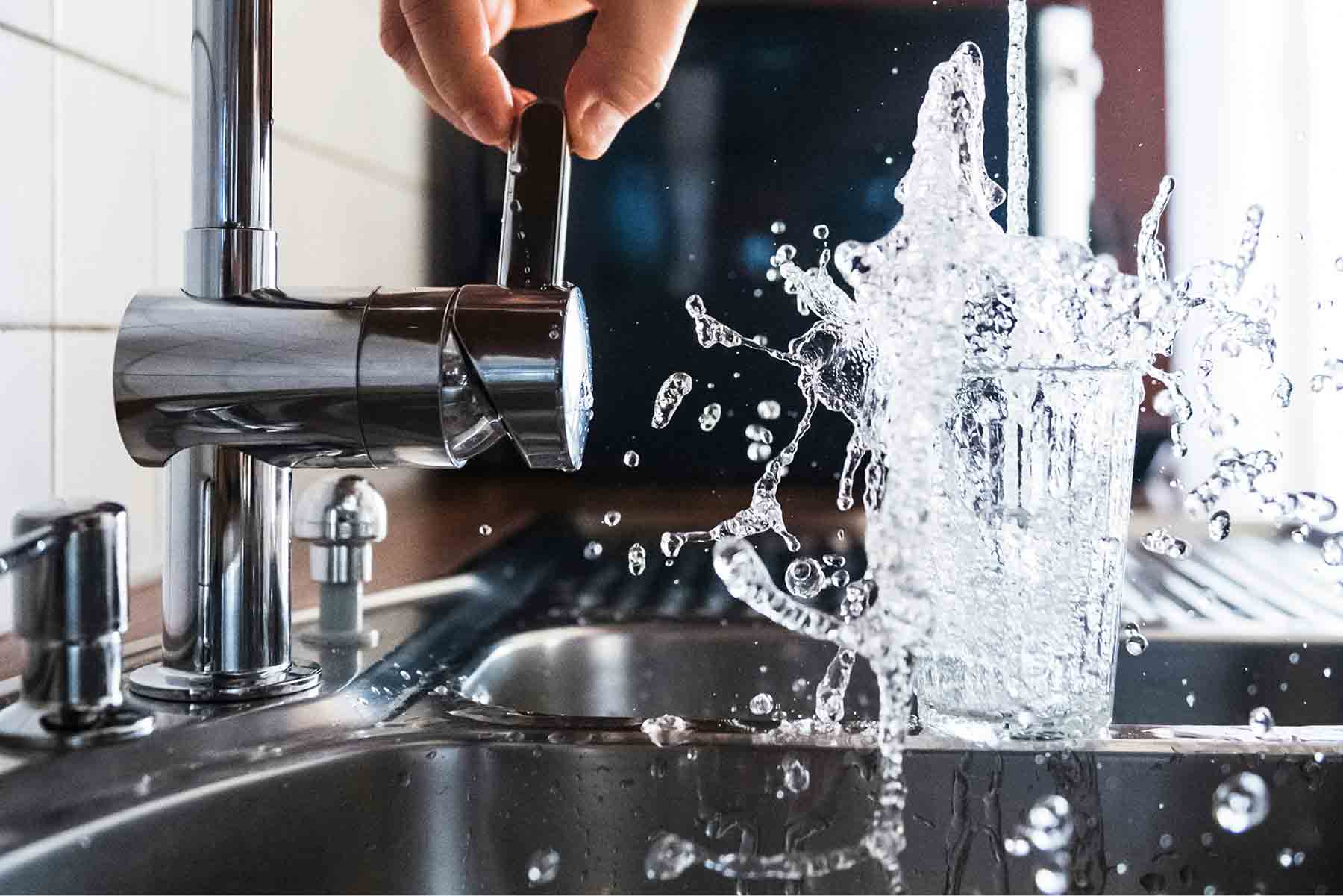Choosing between well water and city water is a significant decision for homeowners to make. The water you drink can impact everything from your health to your finances and the environment. Having an awareness of the pros and cons of each source can help you feel confident in the safety of your household’s drinking water and make the best choice for your home.
What is Well Water?
Well water comes directly from natural underground aquifers. Before reaching your pipes, this water is filtered through layers of soil and rock. Because of this, it often contains minerals like calcium and magnesium. These minerals can be beneficial to health but also may cause hard water issues, leading to the need for water filtration.
Can You Have a Well?
As a homeowner, as long as your property has the necessary space and access to groundwater, you can install a well. Installing a well on your property can provide your household with a reliable water source that is independent of municipal water systems, however, it will need regular testing and maintenance. If you rely on well water, using a water filtration system for well water will help improve your water’s purity.
Pros and Cons of Well Water
Advantages of Well Water:
- Independence from public utilities: No need to rely on the city’s infrastructure or be affected by water outages.
- Naturally filtered: Groundwater goes through natural filtration as it passes through soil and rock layers.
- Free of monthly costs: After installation, well water is often free of monthly water bills, which is helpful for long-term savings.
Disadvantages of Well Water:
- Maintenance: Homeowners are responsible for testing the water regularly, as well as maintaining and repairing the well.
- Contamination risks: Well water can be exposed to bacteria, heavy metals, and other contaminants, therefore requiring testing and effective filtration systems.
- Limited supply: Groundwater levels can fluctuate, potentially affecting water availability.
Filtration System for Well Water
Using a reliable filtration system is important because of the increased risk of contaminants in well water. Common options include sediment filters, carbon filters, and UV light filters to remove bacteria and chemicals. A whole house filter is often recommended to provide your home with comprehensive protection.
What is City Water?
A municipal system provides city water or a local government water system. It is sourced from large bodies of water, such as rivers, lakes, or reservoirs. The water is then treated at a central facility to remove contaminants and meet government health and safety standards.
How City Water Works?
After the water is drawn from natural sources, it goes through several treatment steps, including filtration, chlorination, and often fluoridation, to bring the water quality up to government standards. After treatment, it is distributed through a network of pipes to homes. Many homeowners also prefer a city water filtration system to improve taste and eliminate any lingering chemicals.
Pros and Cons of City Water
Advantages of City Water:
- Regularly tested: City water is monitored for contaminants and must meet EPA standards that guarantee a consistent level of safety.
- Reliable supply: Unlike well water, city water is not affected by groundwater levels, resulting in a steady, endless supply.
- Less maintenance: The city maintains the water infrastructure, freeing homeowners from the trouble of testing and repairs.
Disadvantages of City Water:
- Monthly bills: Homeowners must pay a recurring cost for their water usage.
- Chemicals used in treatment: Some people are concerned about the chlorine and fluoride added to city water, which can affect taste and, in some cases, health.
- Dependence on infrastructure: Any problems with the city’s water pipes or treatment plants can disrupt and affect your water supply.
Filtration System for City Water
Even with regular municipal treatment, many homeowners choose to use filtration systems to improve the taste and quality of city water. Options like carbon filters and reverse osmosis systems can remove chemicals and ensure your water is clean and fresh. Consider investing in professional water filtration services for the best filtration solution.
Key Differences Between Well Water and City Water
-
Water Quality of City water vs. Well:
Well water undergoes natural filtration with no chemical tempering, but may require more frequent testing to ensure safety. City water, although it is treated and regulated, may contain chemicals like chlorine, which can affect taste.
-
Well vs. City Water Cost:
Well water involves upfront installation costs but no monthly bills. City water comes with regular expenses but spares you the trouble of maintaining a well and conducting frequent tests.
-
Maintenance of City Water vs. Well:
With city water, the local government handles testing and repairs. Well water owners must regularly test for contaminants and maintain the well system.
-
Sustainability & Environmental Impact of Well vs City Water:
Well water uses local aquifers, which can reduce dependency on large-scale water processing. However, city water systems require significant energy to treat and distribute water.
-
City vs Well Water Health Considerations:
There are health benefits and risks associated with both city and well water. Well water is mineral-rich which can be beneficial, but may pose health risks if not properly tested. City water meets government health standards but may still contain chemicals that some homeowners prefer to filter out.
Water Testing and Treatment for Well Water
Testing well water regularly is important to guarantee that it is safe to drink. Homeowners using well water should test their supply for contaminants such as bacteria, lead, and nitrates. Solutions like water softeners, filtration systems, and UV purifiers may be needed, Depending on the quality of your water.
City Water Regulations and Quality Control
City water must comply with EPA standards, meaning it’s tested and treated to remove contaminants. However, aging infrastructure or several other issues can lead to your water supply having temporary quality problems. Installing a residential water filtration system can help reduce the stress from possible unwanted chemicals and bad tastes.
Well Water or City Water: Which Option is Right for You?
There are many factors such as location, budget, and lifestyle that should play into your choice between well water or city water. If you live in an area where groundwater is accessible and prefer independence from the city water supply’s treatment and regulations, a well may be ideal. However, if you want a hassle-free supply and don’t mind paying a monthly bill, city water could be the best option for you. For those who want the best of both worlds, a hybrid system may be available, allowing you to tap into both sources as needed.
Understanding your water source and knowing how to properly maintain or filter it can feel overwhelming, but you don’t have to do it alone. Our team of reliable experts at Metro Water Filter of the South is here to answer any questions and provide the professional guidance you need to keep your water safe. Contact us today to schedule your free water analysis and take the first step toward cleaner, healthier water.
Well and City Water FAQs:
Can you have both well water and city water?
Yes, you can have both! Many homeowners will use well water for outdoor tasks like gardening, while still relying on city water for all drinking and household use. It is important for those who use this strategy to keep water from the two systems separate to avoid contamination.
Is city water better than well water?
This depends on your situation and preference. City water is treated and regulated but may still contain chemicals like chlorine. Well water, on the other hand, is naturally filtered and can taste fresher, but requires regular testing to ensure it’s safe. Both have their pros and cons.
Do you pay for well water?
No, there are no monthly water bills for well water since it comes from your own property. However, you’ll need to cover costs for well maintenance, repairs, and testing.
Is well water cleaner than city water?
It can be, but it depends on the water source. Well water is naturally filtered but needs to be tested regularly to check for contamination. City water is treated for safety but may have residual chemicals from the process. Proper filtration can make either option safe and clean.




